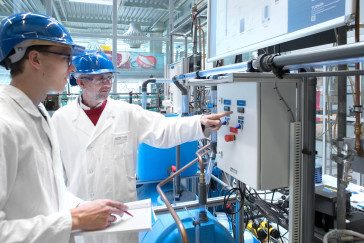This dissertation presents the results of a research project on unraveling the dynamics of facilitating workplace learning through pedagogic practices in healthcare placements. Supervisors are challenged to foster safe learning opportunities and fully utilize the learning potential of placement through stimulating active participation for students while ensuring quality patient care. In healthcare placements, staff shortages and work pressure may lead to stress when facilitating workplace learning. Enhancing pedagogic practices in healthcare placements seems essential to support students in challenging experiences, such as emotional challenges. This dissertation proposes approaches for optimizing learning experiences for students by highlighting the value of day-to-day work activities and interactions in healthcare placements, and shedding light on agency in workplace learning through supervisor- and student-strategies.
DOCUMENT

Purpose Supervisors are responsible to train students in healthcare placements. Although there is knowledge about workplace learning and supervision in general, little is known about supervisors’ pedagogic strategies in specific healthcare placements. In this study, we identify how supervisors’ reasoning and interrelated actions manifest in physiotherapy and nursing work settings. Methods Following the stimulating recall approach, we conducted 16 interviews with supervisors at seven work settings. Using a theoretical framework of workplace supervision, we performed a deductive template analysis. Results Four configurations of pedagogic strategies reveal how supervision manifests in healthcare placements. The results provide unique insights into specific supervision moments, and elucidate the situatedness of the supervisors’ strategies. Conclusions The present study illustrates the variation in aims and focus of supervisors in placements. Supervisors’ pedagogic strategies were found to be mainly based on (A) role modelling, (B) overall support, (C) trust, and (D) letting go. Further research is needed to investigate the interplay between supervisors and students in learning situations within work settings.
LINK
Background: Differences in professional practice might hinder initiation of student participation during international placements, and thereby limit workplace learning. This study explores how healthcare students overcome differences in professional practice during initiation of international placements. Methods: Twelve first-year physiotherapy students recorded individual audio diaries during the first month of international clinical placement. Recordings were transcribed, anonymized, and analyzed following a template analysis approach. Team discussions focused on thematic interpretation of results. Results: Students described tackling differences in professional practice via ongoing negotiations of practice between them, local professionals, and peers. Three themes were identified as the focus of students’ orientation and adjustment efforts: professional practice, educational context, and individual approaches to learning. Healthcare students’ initiation during international placements involved a cyclical process of orientation and adjustment, supported by active participation, professional dialogue, and self-regulated learning strategies.Conclusions: Initiation of student participation during international placements can be supported by establishing a continuous dialogue between student and healthcare professionals. This dialogue helps align mutual expectations regarding scope of practice, and increase understanding of professional and educational practices. Better understanding, in turn, creates trust and favors meaningful students’ contribution to practice and patient care.
DOCUMENT

Werkplekleren is een belangrijk onderdeel van beroepsopleidingen. Toch weten we weinig over hoe praktijkopleiders het leren van studenten op de werkplek ondersteunen. In dit promotieonderzoek wordt de begeleiding van studenten tijdens stages onderzocht.
